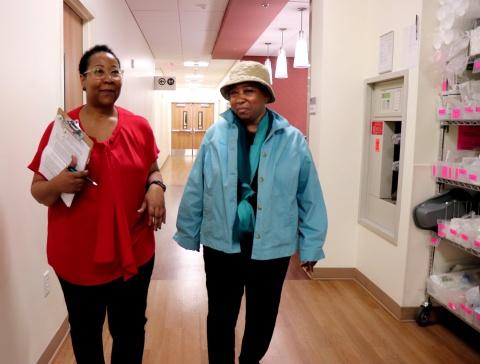
Goodbye 2017, hello 2018! Phyllis Perry, 63, was one of the last participants in 2017 to enroll in and complete her initial onsite visit for the Project Baseline study. Phyllis heard about the study at a senior center in Durham and enrolled at the Duke University School of Medicine.
The Project Baseline study is the first initiative of Project Baseline, an ambitious effort to develop a well-defined “baseline” of human health, and a rich data platform to help researchers better understand health and disease and the transitions between them.
“Studies don’t always include a group of diverse people, but researchers need people from all kinds of backgrounds,” Perry said. “I want to help people, and if I can help someone in the future not get sick, or help find treatments for disease, that’s what I want to do.”
To help eliminate health disparities caused by low representation of African American, Latino, and Asian populations in clinical research studies, the Project Baseline team has focused from the beginning on achieving a sample that reflects the diversitycaptured in U.S. census data.
Phyllis said she has wanted to join a research study for years but could not find one that accommodated her busy schedule as a nanny. The Project Baseline study enrollment fit her schedule, she said, and Duke team members including research aide Cheryl Robinson (pictured above on left), who accompanied her throughout the enrollment, were “delightful.”
“It was a wonderful experience,” she said.
We look forward to continuing to enroll enthusiastic participants like Phyllis in 2018!
In April 2017, Duke University School of Medicine, in partnership with Verily, Google, and Stanford Medicine, announced the initiation of the Project Baseline study, a longitudinal study that will collect broad phenotypic health data from approximately 10,000 participants, who will each be followed over the course of at least four years. The study aims to help researchers and providers better understand the transition from health to disease and identify additional risk factors for disease.
“Through the Project Baseline study, we are aiming to engineer a true twenty-first century approach to health – in a preventive and personalized way,” said Adrian F. Hernandez, MD, MHS, professor of medicine at Duke and member of the DCRI. “Instead of having the annual physical exam that has not changed in decades, we’re hoping to develop new platforms that will discover changes in health as they happen in meaningful and actionable ways.”